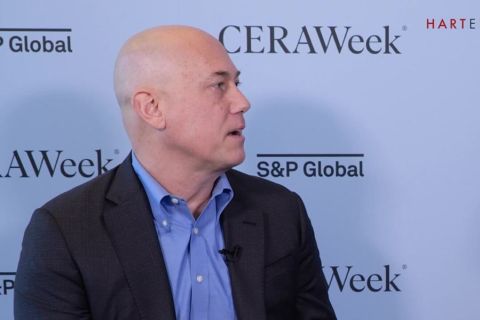
Saudi Aramco drilling rig designed in-house. (Source: Saudi Aramco)
Saudi Arabia has insisted that it remains committed to an IPO of national oil company Saudi Aramco, but said the listing would go ahead “at a time of its own choosing when conditions are optimum.”
The government statement follows months of signs that the kingdom was unwilling or unable to forge ahead with a planned flotation, which could be the largest ever, and a Reuters report saying both the proposed domestic and international stock listings had been called off, with IPO advisers disbanded.
Khalid Al Falih, the Saudi energy minister, issued the statement early on Aug. 23 dismissing “speculation surrounding the cancellation of the IPO as not true.”
People close to the kingdom had already told the Financial Times in recent weeks that Riyadh had postponed the privatization indefinitely, after months of delays, with Saudi Arabia seeking alternative ways to boost the finances of the sovereign wealth fund, which was due to receive the proceeds of the IPO.
The Royal Court instructed Saudi Aramco to acquire the Public Investment Fund’s 70% stake in Saudi petrochemicals and materials maker Sabic, which could raise $70 billion for the fund by moving money from one state coffer to another, three people familiar with the matter said.
To pay for the stake, Saudi Aramco is looking to raise tens of billions of dollars from international banks, which some advisers have said is an alternative to an IPO that achieves much of the same objectives.
People working closely on the deal told the Financial Times that while the planned listing had indeed been put on ice, advisers had not been officially called off, with some bankers diverted to the Sabic project.
Falih said that while the government was still committed to the sale, its timing would depend on multiple factors, including “favorable market conditions” and Saudi Aramco’s planned acquisition of a stake in Sabic.
Falih added that to prepare for the listing, the Saudi government had “undertaken a number of major preparatory measures,” including a new oil and gas tax law, reissuing Saudi Aramco’s long-term exclusive concession for the country’s resources, and appointing a new board of directors. Those measures would “safeguard its interests and those of the company’s future private shareholders,” Falih said.
Ellen Wald, president of Transversal Consulting, said: “Seeing the concession document provides a large amount of assurance to the investor. Otherwise, there is always the fear that the government could invite another company in to develop a resource or even create another oil company.”
The IPO had already been falling behind its original timetable, and the company last month signaled a further delay when chief executive Amin Nasser warned in a television interview that the Sabic deal would “definitely affect the timeframe” for the flotation. He told the Financial Times in June that the Saudi government had yet to determine whether the IPO would take place.
Saudi Arabia has said it wants to sell 5% of Saudi Aramco, the world’s largest oil producer, as part of the push for economic reform driven by Crown Prince Mohammed bin Salman. Prince Mohammed believes the company is worth as much as $2 trillion, but analysts have expressed scepticism that it could achieve that valuation in an IPO.
Falih said in his statement on Aug. 23 that the company had completed its internal program to prepare for the IPO, including amending its bylaws; converting to a joint stock company, ensuring that its financial reporting aligns with potential listing venue requirements; and undertaking the first independent certification of its oil and gas reserves.
He added: “This is all positive progress on what is a complex process, preparing the company and the kingdom for what will ultimately be a global landmark market offering of unprecedented quality and scale.”
The plan for the IPO had included a local listing on the Saudi Tadawul exchange and one or more international markets. London, New York, Hong Kong and Tokyo had all been competing to secure the international listing for their exchanges.
The Saudi Aramco flotation has been at the heart of an ambitious economic reform program driven by Prince Mohammed to diversify Saudi Arabia’s economy beyond oil.
Additional reporting by James Fontanella-Khan.
Recommended Reading
Defeating the ‘Four Horseman’ of Flow Assurance
2024-04-18 - Service companies combine processes and techniques to mitigate the impact of paraffin, asphaltenes, hydrates and scale on production — and keep the cash flowing.
Tech Trends: AI Increasing Data Center Demand for Energy
2024-04-16 - In this month’s Tech Trends, new technologies equipped with artificial intelligence take the forefront, as they assist with safety and seismic fault detection. Also, independent contractor Stena Drilling begins upgrades for their Evolution drillship.
AVEVA: Immersive Tech, Augmented Reality and What’s New in the Cloud
2024-04-15 - Rob McGreevy, AVEVA’s chief product officer, talks about technology advancements that give employees on the job training without any of the risks.
Lift-off: How AI is Boosting Field and Employee Productivity
2024-04-12 - From data extraction to well optimization, the oil and gas industry embraces AI.
AI Poised to Break Out of its Oilfield Niche
2024-04-11 - At the AI in Oil & Gas Conference in Houston, experts talked up the benefits artificial intelligence can provide to the downstream, midstream and upstream sectors, while assuring the audience humans will still run the show.





